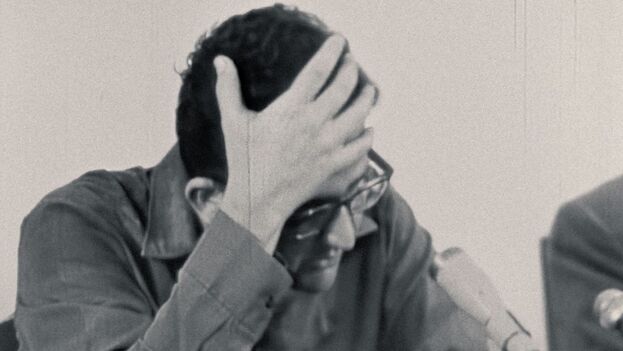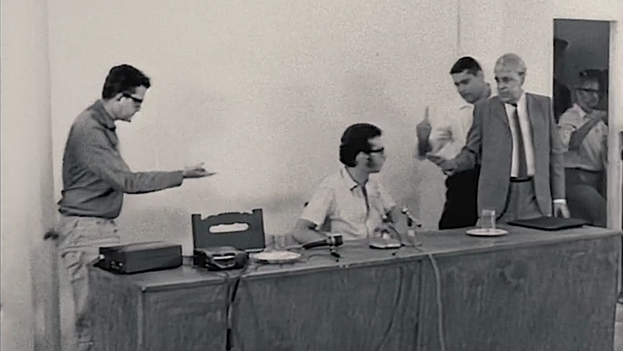
![]() 14ymedio, Havana, 18 February 2023 — On Friday, Cuban writer and translator Jorge Ferrer released several original recordings of the appearance of the poet Heberto Padilla on April 27, 1971 before a group of writers and artists in Havana. The debate prior to the release of these film archives, hidden for decades by State Security and which served as the source for the documentary El Caso Padilla [The Padilla Case] (2022), by filmmaker Pavel Giroud, had recently become a bitter controversy.
14ymedio, Havana, 18 February 2023 — On Friday, Cuban writer and translator Jorge Ferrer released several original recordings of the appearance of the poet Heberto Padilla on April 27, 1971 before a group of writers and artists in Havana. The debate prior to the release of these film archives, hidden for decades by State Security and which served as the source for the documentary El Caso Padilla [The Padilla Case] (2022), by filmmaker Pavel Giroud, had recently become a bitter controversy.
In a note on his blog El tono de la voz [The Tone of Voice], Ferrer states that he is sharing the audiovisual material with the authorization of the person who sent it to him, although he did not offer his identity. In addition, he argued the need to make the documentary available to the public. “I am obliged to share the story, which is both mine and everyone’s,” he said.
This Thursday, Ferrer, who is a translator and an expert in Russian literature living in Barcelona, revealed that he had “copies of some sections, perhaps all, of the originals that Giroud used,” and commented on the controversy about the alleged “kidnapping” of the complete archives by the director.
Ferrer shared four film files that have been digitized, from two to 40 minutes long, that record the confession which Padilla was forced to make by State Security, after being detained for several weeks. “The revolutionary government offered him a confession in exchange for his freedom,” Ferrer explains.
In addition to Padilla’s appearance, the material includes the full remarks of other participants in the meeting, who were forced to blame themselves for having held “revolutionary conversations” and for having frequently met with “enemies of the Revolution.” Among the writers who took the floor after Padilla’s extensive appearance are the poets César López, Manuel Díaz Martínez, Padilla’s own wife, Belkis Cuza, and the narrator and journalist Norberto Fuentes.
In the case of Fuentes, whom Padilla exposed during his speech as an agent of State Security and whom he accused of sharing his “counterrevolutionary opinions,” the fragments shared by Ferrer do not include his attempt at a defense alleging an “injustice” against his person not only on the part of the poet, but also by the Government itself, which disregarded his “claims” and wouldn’t hear them.

Fuentes is quickly silenced by Armando Quesada, a lieutenant of the Armed Forces and then director of the magazine El Caimán Barbudo. “I have been marginalized from the revolutionary process,” says Fuentes, but Quesada disavows the opinions of those who claimed that the Communist Party was “alienated” from the intelligentsia.
The absence of this discussion in the archives published by Ferrer, which however were used in Giroud’s film, is evidence that there are still important fragments of the archive to be delivered to the public. In recent weeks, numerous intellectuals and artists have demanded from the filmmaker the full publication of the original material, while others defend Giroud’s right to share it when he deems appropriate, after El Caso Padilla is screened at several film festivals.
The director’s response has been that the complete recording “is going to be released, but not now.” Some Cuban intellectuals have expressed their point of view on Giroud’s documentary and the context that has surrounded its projection. Orlando Luis Pardo Lazo, in Hypermedia magazine, believes that the night of Padilla’s appearance was “the longest of national cinematography.” Pardo Lazo says that “there is no right to keep the original filming a secret. By retaining it — and this is the responsibility of all those who treasure the original recording — it smells of ego or duty fulfilled in a cautionary way.”
As for Néstor Díaz de Villegas, he affirms in Yucabite that Giroud made his documentary in “collaboration with the ghost of Santiago Álvarez,” who collaborated with the original filming. That night, he points out, “Padilla emerges as one of the comic geniuses in the history of cinematographic art. It is a comedy of entanglements where apology is denunciation and delation, exegesis.”
“Giroud has decided that we still can’t remember completely,” says Carlos Manuel Álvarez in El Estornudo. Regarding the retention of the original material by the director, Álvarez comments: “I don’t know what I would have done instead; I have never had in my possession, fortunately, the memories of anyone other than me.”
Translated by Regina Anavy
Please see the links here.
An English translation of the transcript of Padilla’s Public Confession is here.
A 2021 staged reading of Padilla’s confession and other speakers, with English subtitles, is here.
____________
COLLABORATE WITH OUR WORK: The 14ymedio team is committed to practicing serious journalism that reflects Cuba’s reality in all its depth. Thank you for joining us on this long journey. We invite you to continue supporting us by becoming a member of 14ymedio now. Together we can continue transforming journalism in Cuba.
